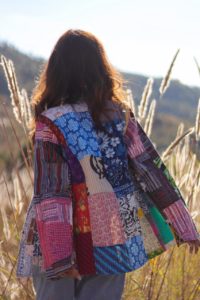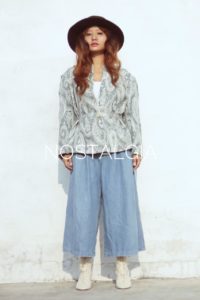As the youth become better aware of their own consumption patterns, they are progressively transitioning towards more sustainable practices in terms of fashion. Through practices of thrifting, reuse and upcycling, many have started to live a more responsible lifestyle in Meghalaya.
“When I first started out my imperfect zero waste practice, I was looking for more sustainable options in clothing, since I couldn’t afford handwoven or designer garments so thrifting was the best option I could find,” said Coretta Sangma, the entrepreneur behind the Nostalgia Label in Tura. Sangma works in the fashion industry and has witnessed first-hand, the negative impact that consumption of fast fashion leads to. She expressed her desire to work towards fixing the broken fashion system. She said, “Instead of linear model of give-take-waste, I started assessing the life cycle of my clothing and aimed at keeping it circular.” There are many who are not aware of how the industry actually functions. She feels a sense of responsibility to create awareness regarding the issue, and aims to provide more sustainable options to those who want to shift from the linear model.
 According to Sangma, thrifted garments are good for the environment as their life cycle is getting extended. “Since there is no use of virgin resources it saves a lot of water, energy, emissions and reduces our carbon footprint considerably,” she added. Manufacture of cheap and fast clothing involves use of chemical dyes, which pollute our waterways. Besides issues related to the environment, thrifting also has humanitarian implications. “Each time we invest our money in thrifting, we are boycotting the fast fashion industry and demanding change in the system so, I find it very revolutionary in nature,” she stated.
According to Sangma, thrifted garments are good for the environment as their life cycle is getting extended. “Since there is no use of virgin resources it saves a lot of water, energy, emissions and reduces our carbon footprint considerably,” she added. Manufacture of cheap and fast clothing involves use of chemical dyes, which pollute our waterways. Besides issues related to the environment, thrifting also has humanitarian implications. “Each time we invest our money in thrifting, we are boycotting the fast fashion industry and demanding change in the system so, I find it very revolutionary in nature,” she stated.
Besides selling thrifted items, she has collaborated with local artisans and made upcycled pieces from old and used Dakmanda. She is planning to make more products incorporating the Dakmanda, such as hats, caps and more clothing. She also houses a collection of handmade items made using sustainable materials like hemp or handwoven fabrics.
Owner of Shillong-based thriftstore Va-le Closet, Badarishisha Chyrmang stated she was introduced to this lifestyle in college. Initially, she got into thrifting not because of environmental concerns but to consume fashion on a budget. She said, “Now, since I have an online thrift store, I have a more in depth knowledge on thrifting. It’s not just about saving money, but also about recycling clothes that are worth wearing and saving Mother Earth.”
 Stating that she has always believed in the 3Rs of waste management (Reduce, Reuse, Recycle) Chyrmang added, “Although I might not be able to apply all three in my daily life, even just recycling and reusing of items can save the earth at least by a small percentage.” Fashion industry generates tonnes of waste, which leads to micro plastic pollutants, and pollution of water and soil, among others. She feels if more people were to shift to thrifting, we might be able to lessen and slow down pollution of the Earth.
Stating that she has always believed in the 3Rs of waste management (Reduce, Reuse, Recycle) Chyrmang added, “Although I might not be able to apply all three in my daily life, even just recycling and reusing of items can save the earth at least by a small percentage.” Fashion industry generates tonnes of waste, which leads to micro plastic pollutants, and pollution of water and soil, among others. She feels if more people were to shift to thrifting, we might be able to lessen and slow down pollution of the Earth.
Dipse Sangma, a believer in thrifting and sustainable fashion stated, “By now it’s common knowledge that fashion industry is amongst the top industries responsible for pollution.” She added, “The customers as fashion lovers, what we can do is we can show support to slow and sustainable fashion and do our bit to save our planet.” The best way to do this is by thrifting or buying clothes which are made of recycled materials, she said.
Kasaan Chokchim, a student from NEHU who loves thrifting said purchasing used items generates less waste which is beneficial for the environment. “Sustainable fashion according to me is being kind to the environment and also choosing quality over quantity,” Chokchim stated. She urged people to choose sustainable fashion over fast fashion, vintage sustainable items over trends that last only for a few years.
“The saying ‘One man’s trash is another man’s treasure’ is very much true. I would recommend anyone who is missing out on thrifting as it is not only convenient but also environment friendly,” she added.
 Some people are sceptical as thrifting has long been associated with misconceptions. Chyrmang said, “Most people think that thrift stores offer low quality items at double the appropriate price or they are dirty and out of trend.” Some people also believe that thrift store owners often attempt to scam their customers. She stated that such misconceptions are being proven wrong in recent times. The store owners take extra care while handpicking the items. “They keep in mind the quality of the product first, followed by recent trends,” she added.
Some people are sceptical as thrifting has long been associated with misconceptions. Chyrmang said, “Most people think that thrift stores offer low quality items at double the appropriate price or they are dirty and out of trend.” Some people also believe that thrift store owners often attempt to scam their customers. She stated that such misconceptions are being proven wrong in recent times. The store owners take extra care while handpicking the items. “They keep in mind the quality of the product first, followed by recent trends,” she added.
However, there are certain concerns regarding the new practice of thrifting. “Due to recent popularity of thrifting in India I’ve noticed major greenwashing and selling new products as thrifted,” stated Sangma. Thrifted garments are supposed to be items which have been gently worn by the previous owner, but the products sold in most of the thrift stores are new. She added that those thrift stores selling factory reject garments can be considered sustainable still, as they are not sold in showrooms or incinerated, which ultimately end up in landfills. However, in order to not create misconceptions, she said it would be better to use the correct terms. According to her, companies have been exploiting this term and trying to greenwash the consumers in order to boost sales. “But we have more progressive consumers now who want transparency and they try to track the supply chain,” she added.
“Sustainable fashion is the future because if we want human kind to exist in this planet we need to work with nature and not against it,” said Sangma. She explained that transition to a sustainable lifestyle must first take place within ourselves, as it is never easy or convenient. People have to be more receptive towards others and connect with nature in order for the transition to take place. She agreed that it is a slow process as people are habituated to an unhealthy system. Speaking about how mindful consumption starts with baby steps, she urged people to start asking hard questions. “Never be scared of how uncomfortable those questions and the answers which you find out can be,” she added.
Chyrmang stated, “We live in a world of fast fashion and rapid development where slowing down is not an option.” She said if promoting sustainable fashion leads to saving and preserving the planet Earth for our future generation, we should definitely promote it.



